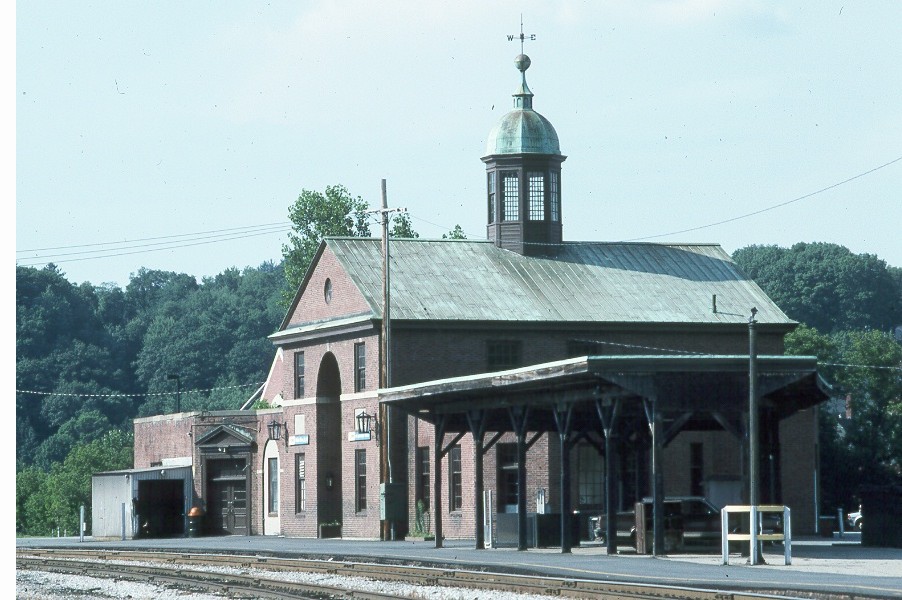White River Junction, Vermont
On Vermont�s eastern border with New Hampshire stands
the quaint railroad town of White River Junction. In the heyday of New England�s
passenger trains, travelers from Boston going to Montreal almost always passed
through White River Junction. Trains originating in New York City had a choice
of routings, either on the Delaware & Hudson for an all Empire State
routing, or if using the Central Vermont or Boston & Maine Railroads,
their train would go via White River Junction. It was a wonderfully busy
station with some thirty passenger trains a day in the late 1930�s.
The present depot opened December 8, 1937 and was built
in a Colonial Revival style of architecture, common to many public buildings
in New England. The large depot site is prominently located at the crossing
and junction point of Boston & Maine routes to the east and southeast. On
the west side of the depot are the Connecticut River lines of the former
Central Vermont and Boston & Maine joint trackage to Bellows Falls.
Passenger trains on these tracks included through services of CV and parent
Canadian National to New York and Washington DC. The station is surrounded by
track in the middle of the downtown area of White River Jct. With all these
iron diamonds, it is not surprising that one of the B&M�s classic ball
signals would be found here. All trains were required to stop within 1,000
feet of the crossing before proceeding when the appropriate signal was
displayed. A recent article in Model Railroader magazine details the signals:
"One ball allowed trains from the CV north end to proceed onto B&M�s
New Hampshire Division heading east. Two balls allowed B&M New Hampshire
Division trains from the east to cross or switch the diamonds. Three balls
allowed B&M Fitchburg Division trains from the north to cross or switch
the diamonds. Four balls allowed trains from the CV south end to proceed onto
the B&M Fitchburg Division heading north. If no signal was displayed all
trains had to stop and could only proceed as directed by the signalmen."
It is believed the ball signal was used until at least 1958.
The station building features a two-story center section
with copper roof and a neat Colonial cupola. Classic photos of the depot show
the cupola topped by a copper steam locomotive weather vane. The locomotive
was modeled from one of B&M�s P-2 class, 4-6-2 Pacific�s. Red brick,
and white cast stone lintels were used in the construction, along with typical
multi-paned, Colonial windows. Originally, the waiting room featured
Colonial-style maple chairs and some small round tables. Benches were later
added. North of the depot, across the tracks, is a large V shaped Railway
Express facility. A baggage room, mail handling, and storage areas occupied
the north end of the station, while the south wing contained the waiting room
and a lunch counter restaurant. The center section upper floor housed a
trainmen�s locker room. What a treat it must have been to change trains in
White River Junction and have lunch at the cozy confines of the station�s
lunch counter as steam pulled consists rumbled past the restaurant windows!
White River Junction still sees passenger train service
today with Amtrak�s Vermonter, service from Washington, D.C. to St. Albans,
Vermont.

All is quiet along the Central Vermont
and Boston & Maine tracks as the White River Junction station basks on a
warm, sunny late afternoon of July 27, 1990. The glory years that saw such
neat name trains like the Ambassador, Cheshire, Connecticut Yankee, Day White
Mountains, Washingtonian, New Englander, and the Montrealer are gone. In later
years, B&M ran Budd RDC�s on many of the few remaining trains. Alas, in
2001, the Central Vermont and Boston & Maine are now also gone. CV has
been divested from parent Canadian National and is now called the New England
Central. The venerable name Boston & Maine has disappeared from the
Official Guide and is now known as Guilford Rail System. Today the only
passenger train service is Amtrak�s daily Vermonter, with the southbound
train arriving about mid morning. The northbound train arrives in the early
evening hours.